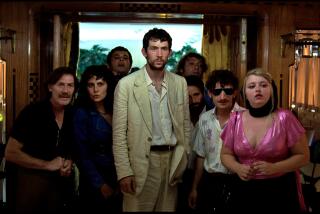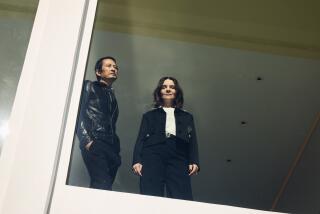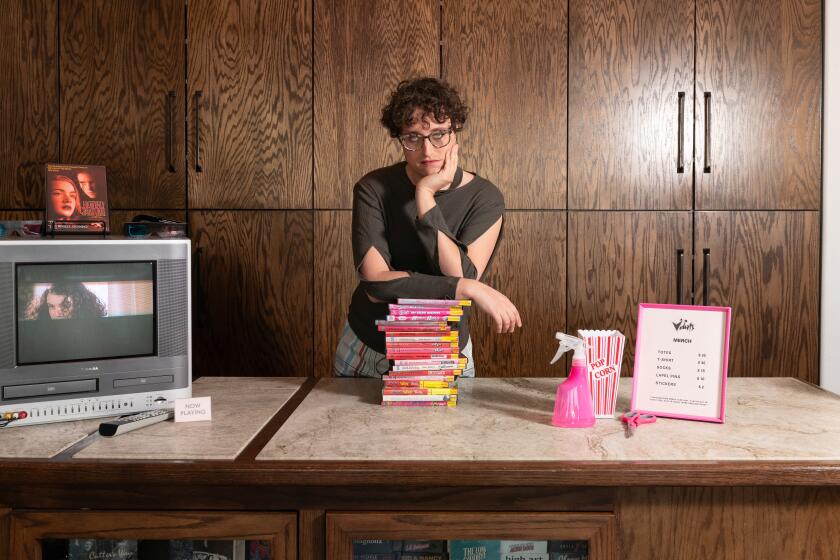Review: Juliette Binoche lights up Claire Denis’ exquisite ‘Let the Sunshine In’
Toward the end of “Let the Sunshine In,” Claire Denis’ wise and exquisite new movie, Isabelle, a romantically hopeless and hopelessly romantic Parisian artist, seeks wisdom from a sort of psychic love doctor. (Isabelle is played, superbly, by Juliette Binoche; the actor who plays the psychic, also superbly, is best left for you to discover.) He counsels her to “be open,” to not settle down with a partner too soon or close herself off to any of the men who might enter her life.
This advice, in some ways a more succinct version of the movie’s English title (an imperfect translation of the French one, “Un Beau Soleil Intérieur”), might strike the viewer as both useless and redundant. Few could accuse Isabelle of not being open. Over the past 90 minutes or so, we have watched her drift with weary optimism from one lover to the next. She has rejected as many men as she has embraced, but never without giving them the full measure of her sharp, curious and startlingly honest consideration.
“Open” is also a good word to describe the sensibility of the French writer-director Claire Denis, who, in brilliantly elliptical films like “Beau Travail” and “The Intruder,” refuses to approach the world with a rigid narrative template in hand. The same is equally true of her tender, intimate relationship studies, like “Friday Night” and “35 Shots of Rum,” which are particularly attuned to the uncertainties of human existence, culminating in moments of bittersweet realization that seem to have been arrived at honestly rather than determined in advance.
“Let the Sunshine In” belongs in their company, even if the moment of realization, in this case, is suspended indefinitely. Denis and her writing partner, the novelist and playwright Christine Angot, have woven a sublime comedy of sexual indecision. They mine Isabelle’s affairs for humor as well as heartache, and do it with such delicacy that you may be hard-pressed to tell which is which. What do women want? More movies as emotionally intelligent and fine-grained as this one, I suspect, and I can attest that they are hardly alone.
But if there is such a thing as the Denis touch (with apologies to Ernst Lubitsch), then it is as difficult to nail down as it is to reproduce. Even if Hollywood were in the habit of taking middle-aged female desire seriously, rather than viewing it as something to be dismissed, sentimentalized or condescended to, “Let the Sunshine In” would feel like a remarkably singular achievement. No picture with a heroine like Isabelle could really be anything else.
Binoche turns Isabelle into a kaleidoscope of human emotion: She’s sensitive, charming, prickly, impulsive, analytical and never uninteresting. The story finds her recently divorced and at a transitional point in her career, though those details are left pointedly unexamined. Over the course of a few days, weeks and possibly months (the length of time that elapses between scenes is slyly indeterminate), Isabelle grazes from a buffet of suitors spanning a wide range of ages, professions, temperaments and body types.
The unambiguous worst of the lot is Vincent (an excellent Xavier Beauvois), a happily married banker who treats Isabelle with the same boorish entitlement inside and outside the bedroom. (Early on the two have a drink at a bar, the gliding movement of the camera and the lengthy duration of the shot suggesting both restlessness and entrapment.) Isabelle’s next beau, an unhappily married stage actor (Nicholas Duvauchelle), seems gallant by comparison, though his endless hesitation reveals him to be a similarly irritating study in self-absorption.
There are other men, too, and the movie sifts through them almost distractedly, as though expressing its heroine’s own mounting impatience. There is her ex-husband, François (Laurent Grévill), with whom she has a 10-year-old daughter and a complicated emotional history that’s distilled into two brief, potent encounters. Sylvain (Paul Blain), a working-class loner, sweeps her off her feet in a small-town club, but their passion is overshadowed by questions of long-term compatibility. Closer to home is an art-world friend, Marc (Alex Descas), whose quiet, reserved demeanor suggests all manner of tantalizing possibilities.
Language and its innumerable pitfalls are a rich and endless source of comic anxiety. Isabelle can be forcefully eloquent one minute and hopelessly tongue-tied the next, in a movie that is very much about people struggling to find the right words to express themselves. It’s possible to imagine Denis and Angot enduring a similar collaborative process; they initially conceived the picture as an adaptation of “A Lover’s Discourse: Fragments,” a 1977 essay by the late French theorist Roland Barthes. They quickly scrapped that idea in favor of their own discourse, rooted in their personal histories, but the concept of fragmentation remains.
“Let the Sunshine In” might be the lightest, most charming divertissement of Denis’ career, but beneath its seductive, glowing surface (gorgeously photographed by the director’s regular collaborator Agnès Godard), the internal rhythms are as rigorous and elusive as in any of her work. Isabelle’s affairs flow together with no interest in tidy beginnings or conclusive endings. We remember them, in retrospect, as a series of arguments and embraces and moody car rides home. There’s also one blissfully impromptu dance sequence, set to Etta James’ “At Last,” that reaffirms Denis’ genius for turning popular music into the perfect cinematic moment.
By the end, the question of whether she will find Monsieur Right feels both unanswerable and beside the point. “Let the Sunshine In” is structured around a rigorously simple, even radical idea: The time we spend with each of Isabelle’s lovers is worthwhile only to the extent that it helps her discover something essential about who she is. At times the movie is about nothing more (or less) profound than the play of conflicting emotions on Binoche’s face, the coherence with which she can pivot, in a single scene, from laughing serenity to piercing self-doubt.
The average (and even above-average) romantic comedy directs its energies toward securing a happy outcome for its characters. “Let the Sunshine In” is bound by no such obligation, or indeed any obligation to anyone except Isabelle and her own openness. Another word for which might be freedom — to choose, to enjoy, to find fault, to keep looking.
------------
‘Let the Sunshine In’
(Not rated)
(In French with English subtitles)
Running time: 1 hour, 35 minutes
Playing: Laemmle’s Royal Theatre, West Los Angeles
See the most-read stories in Entertainment this hour »
Movie Trailers
More to Read
Only good movies
Get the Indie Focus newsletter, Mark Olsen's weekly guide to the world of cinema.
You may occasionally receive promotional content from the Los Angeles Times.







